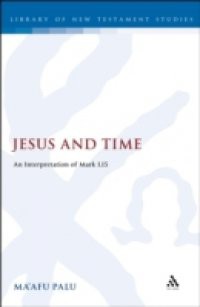This work offers an examination of Jesus' conception of time on the basis of Mark 1.15. Palu contends that the background which makes Mark 1.15 most intelligible is God's covenant with day and night which is established in the act of creation, specified in prophetic eschatology, and developed in Second Temple literature; it is God's commitment to give day and night in their appointed time, promising the restoration of Israel under David's offspring. On the basis of recent developments in scholarly literature concerning the Greek verbal aspect, this study argues that the perfect verbs in Mark 1.15 denote an ongoing dynamic of time fulfilment, closely tied to the ultimate restoration of Israel. This begins with the appearance of Jesus during the days of John the Baptist and is mapped onto two phases of the horizon of Jesus' view of time. Palu concludes that the biblical notion of time is to be tied intimately to the hope of the restoration of Israel, ultimately manifested as the establishment of the Kingdom of God.

